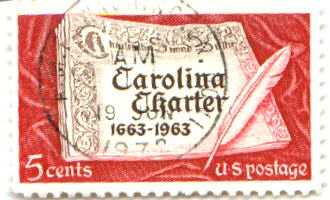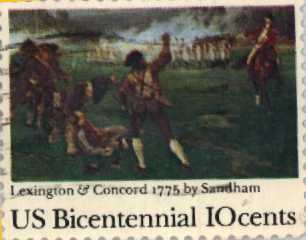Colonial Economy
Whatever early colonial prosperity there was resulted from trapping and trading in furs. In addition, the fishing industry was a primary source of wealth in Massachusetts. But throughout the colonies, people relied primarily on small farms and self-sufficiency. Households produced their own candles and soaps, preserved food, brewed beer and, in most cases, processed their own yarn to make cloth. In the few small cities and among the larger plantations of North and South Carolina and Virginia, some necessities and virtually all luxuries were imported -- in return for tobacco, rice and indigo exports, which produced large profits in England's London, Bristol and Liverpool markets. In these areas, trade and credit were essential to economic life. Supportive industries developed as the colonies grew. A variety
of specialized operations, such as sawmills and gristmills, began
to appear. Shipyards were opened to build fishing fleets and, in
time, to build the basic merchant marine; oak, which had become
relatively rare in England, was easily available in New England.
Iron manufacturing also gradually began to develop in the
colonial era.
Supportive industries developed as the colonies grew. A variety
of specialized operations, such as sawmills and gristmills, began
to appear. Shipyards were opened to build fishing fleets and, in
time, to build the basic merchant marine; oak, which had become
relatively rare in England, was easily available in New England.
Iron manufacturing also gradually began to develop in the
colonial era.
By the 18th century, regional patterns of development had become clear and reasonably stable: The New England colonies produced large-scale ship builders and ship operators; plantations in Maryland, Virginia and the Carolinas grew staple crops of tobacco, rice and indigo; and the middle colonies of New York, Pennsylvania, New Jersey and Delaware were shippers of general crops and furs. In all three regions standards of living were very high -- higher for workers than in England itself. But because the colonies were slow to show profits, many English capital investors withdrew, leaving the field open to entrepreneurs among the colonists.
As a result, by 1770 the North American colonies were
economically and politically ready to become part of the emerging
self-government movement, which had dominated English politics
since the time of James I (1603-25). Disputes developed over
taxation of colonies and other matters.  Yet few Americans thought
that the mounting quarrel with the English government would lead
to independence for the colonies. Rather, they hoped for a
modification of English taxes and regulations that would satisfy
their demand for a greater measure of self-government. Like the
English political turmoil of the 17th and 18th centuries, the
American Revolution was political and economic in motivation, led
by the emerging middle class with its rallying cry of
"unalienable rights to life, liberty and property" -- a phrase
openly borrowed from English philosopher John Locke's Second
Treatise on Civil Government (1690). But in April 1775 an
event occurred that would lead to a total political separation.
British soldiers, intending to capture a colonial arms depot at
Concord, Massachusetts, and forestall a colonial rebellion,
clashed with colonial militiamen and someone-no one knows
who-fired a shot, beginning the American War of Independence. The
war lasted until the signing of a peace treaty in 1783 that
declared the independence of the new nation, the United States.
Yet few Americans thought
that the mounting quarrel with the English government would lead
to independence for the colonies. Rather, they hoped for a
modification of English taxes and regulations that would satisfy
their demand for a greater measure of self-government. Like the
English political turmoil of the 17th and 18th centuries, the
American Revolution was political and economic in motivation, led
by the emerging middle class with its rallying cry of
"unalienable rights to life, liberty and property" -- a phrase
openly borrowed from English philosopher John Locke's Second
Treatise on Civil Government (1690). But in April 1775 an
event occurred that would lead to a total political separation.
British soldiers, intending to capture a colonial arms depot at
Concord, Massachusetts, and forestall a colonial rebellion,
clashed with colonial militiamen and someone-no one knows
who-fired a shot, beginning the American War of Independence. The
war lasted until the signing of a peace treaty in 1783 that
declared the independence of the new nation, the United States.
